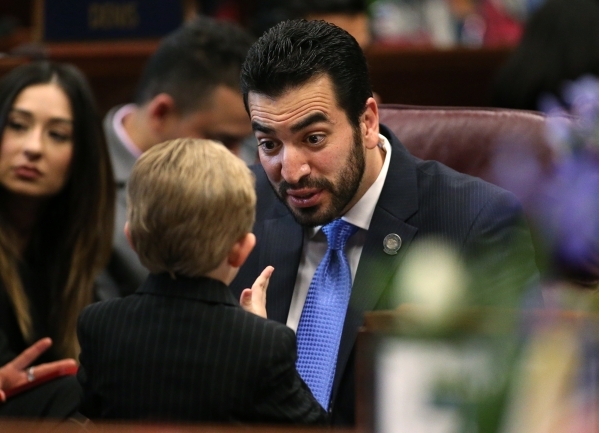One tough vote for Democrats
There's plenty of confusion out there when it comes to religious freedom.
And some confusion bubbled up during a forum Thursday featuring the four Democratic candidates seeking the nomination for Congressional District 4. Somebody tried to trip up state Sen. Ruben Kihuen, D-Las Vegas, with a question about his support for a religious freedom bill in the Nevada Legislature.
Kihuen, who in late August stumbled over this issue on the "Ralston Live" TV show, pivoted to his preferred answer: He advocated against the so-called Nevada Protection of Religious Freedom Act in 2015.
True enough.
But two years earlier, he was among the co-sponsors of a similarly named bill, albeit one with some significant differences. And both the 2013 version and the 2015 version had a poison pill that could have caused judicial havoc.
So why support it? The answer lies in the internecine world of Nevada legislative politics, and is set in a time before the infamous 2014 decision in Burwell v. Hobby Lobby Stores Inc.
Lawmakers in 2013 — including Democrats Mo Denis, Aaron Ford, Justin Jones, David Parks, Tick Segerblom, Debbie Smith and Joyce Woodhouse — all signed on with Kihuen to Senate Bill 192, sponsored by then-Republican state Sen. Barbara Cegavske. The bill essentially banned government from "substantially burdening" a person's free exercise of religion.
It was odd, to say the least, to see liberal Democrats such as Segerblom on the bill, until you realize this was the same Legislature that began the process of legalizing gay marriage in Nevada. The Nevada Preservation of Religious Freedom law served as comfort to those who feared the move toward marriage equality.
Also, the bill was amended to ensure it couldn't be used to justify discrimination or violations of civil rights laws.
In the end, SB192 passed the Senate 14-7 (with some of its original Democratic co-sponsors voting no — Ford, Smith, Parks and Woodhouse). It later died in the Assembly Judiciary Committee, which was then under Democratic control. In fact, the bill's certain death in the Assembly may have given its reluctant Senate co-sponsors the impetus to push the green button.
It's a good thing it died, too. Religious freedom bills aren't really about religious rights, but rather the legal standard under which courts examine alleged violations of religious rights. SB192 imposed the standard of "strict scrutiny," which means even laws that apply to all people and all religious equally must further a compelling state interest and be the least restrictive method of doing so. That was also the legal standard created when then-Rep. Chuck Schumer, D-N.Y., and then-U.S. Sen. Ted Kennedy, D-Mass., introduced the national Religious Freedom Restoration Act in 1993, which was signed into law by then-President Bill Clinton. (A court ruling later held the law wasn't binding on states, although several have enacted versions of it.)
But that bit of pandering blew up 20 years later, when Hobby Lobby Stores successfully asserted it was entitled to protection under the Religious Freedom Restoration Act and shouldn't have to provide certain types of contraception to its employees. How do you like the law now, Democrats?
But that decision was more than a year away when Kihuen and his fellow Democrats passed SB192. And when new versions of the Nevada Protection of Religious Freedom Act were introduced in 2015, they got no Democratic support and went nowhere. (Tellingly, those bills lacked any reference to civil rights and also contained the strict scrutiny language.)
Kihuen was criticized for saying on "Ralston Live" that "just because you sign on to a bill doesn't mean that you support it." It was a confusing remark, although it's clear the events of 2013 left several Democrats — including Kihuen — in precisely that position.
--Steve Sebelius is a Review-Journal political columnist. Follow him on Twitter (@SteveSebelius) or reach him at 702-387-5276 or ssebelius@reviewjournal.com.




























